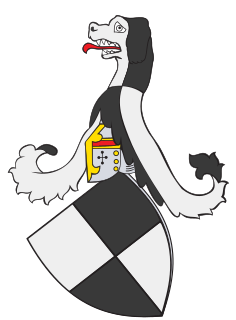Arianism is a nontrinitarian Christological doctrine which asserts the belief that Jesus Christ is the Son of God who was begotten by God the Father at a point in time, a creature distinct from the Father and is therefore subordinate to him, but the Son is also God. Arian teachings were first attributed to Arius, a Christian presbyter in Alexandria of Egypt. The term "Arian" is derived from the name Arius; and like "Christian", it was not a self-chosen designation but bestowed by hostile opponents—and never accepted by those on whom it had been imposed. The nature of Arius's teaching and his supporters were opposed to the theological views held by Homoousian Christians, regarding the nature of the Trinity and the nature of Christ. The Arian concept of Christ is based on the belief that the Son of God did not always exist but was begotten within time by God the Father.

David is described in the Hebrew Bible as the third king of the United Monarchy of Israel and Judah, after Ish-bosheth. In the biblical narrative, David is a young shepherd who gains fame first as a musician and later by killing the enemy champion Goliath. He becomes a favorite of King Saul and a close friend of Saul's son Jonathan. Worried that David is trying to take his throne, Saul turns on David. After Saul and Jonathan are killed in battle, David is anointed as King. David conquers Jerusalem, taking the Ark of the Covenant into the city, and establishing the kingdom founded by Saul. As king, David commits adultery with Bathsheba, leading him to arrange the death of her husband Uriah the Hittite. Because of this sin, God denies David the opportunity to build the temple, and his son Absalom tries to overthrow him. David flees Jerusalem during Absalom's rebellion, but after Absalom's death he returns to the city to rule Israel. Before his peaceful death, he chooses his son Solomon as successor. He is honored in the prophetic literature as an ideal king and the forefather of a future Messiah, and many psalms are ascribed to him.

The House of Habsburg and also officially called the House of Austria, was one of the most influential and distinguished royal houses of Europe. The throne of the Holy Roman Empire was continuously occupied by the Habsburgs from 1438 until their extinction in the male line in 1740. The house also produced kings of Bohemia, Hungary, Croatia, Galicia, Portugal and Spain with their respective colonies, as well as rulers of several principalities in the Netherlands and Italy. From the 16th century, following the reign of Charles V, the dynasty was split between its Austrian and Spanish branches. Although they ruled distinct territories, they nevertheless maintained close relations and frequently intermarried.

The House of Hohenzollern is a German dynasty whose members were variously princes, electors, kings and emperors of Hohenzollern, Brandenburg, Prussia, the German Empire, and Romania. The family arose in the area around the town of Hechingen in Swabia during the 11th century and took their name from Hohenzollern Castle. The first ancestors of the Hohenzollerns were mentioned in 1061.

Jacob, later given the name Israel, is regarded as a Patriarch of the Israelites and so, he is an important figure in Abrahamic religions, such as Judaism, Christianity, and Islam. Jacob first appears in the Book of Genesis, the son of Isaac and Rebecca, the grandson of Abraham, Sarah and Bethuel, the nephew of Ishmael. He was the second-born of Isaac's children, the elder being his fraternal twin brother Esau. However, by deceiving Isaac when he was old and blind, Jacob was able to usurp the blessing that belonged to Esau as the firstborn son, and become the leader of their family. Following a severe drought in his homeland Canaan, Jacob and his descendants, with the help of his son Joseph, who had since become a confidante of Pharaoh, moved to Egypt, where he died, aged 147 years, and was buried in the Cave of Machpela.

Simon & Garfunkel were an American folk-rock duo consisting of singer-songwriter Paul Simon and singer Art Garfunkel. One of the best-selling music groups of the 1960s, their biggest hits—including "The Sound of Silence" (1965), "Mrs. Robinson" (1968), "The Boxer" (1969), and "Bridge over Troubled Water" (1970)—reached number one on singles charts worldwide.

The Christian doctrine of the Trinity holds that God is one God, but three coeternal consubstantial persons or hypostases—the Father, the Son, and the Holy Spirit—as "one God in three Divine persons". The three persons are distinct, yet are one "substance, essence or nature" (homoousios). In this context, a "nature" is what one is, whereas a "person" is who one is. Sometimes differing views are referred to as nontrinitarian. Trinitarianism contrasts with positions such as Binitarianism and Monarchianism, of which Modalistic Monarchianism and Unitarianism are subsets.

Edward IV was King of England from 4 March 1461 to 3 October 1470, and again from 11 April 1471 until his death. He was the first Yorkist king.

The British royal family comprises Queen Elizabeth II and her close relations. There is no strict legal or formal definition of who is or is not a member of the British royal family.

Catherine of Valois was the queen consort of England from 1420 until 1422. A daughter of Charles VI of France, she married Henry V of England, and gave birth to his heir Henry VI of England. Her liaison with Owen Tudor proved the springboard of that family's fortunes, eventually leading to their grandson's elevation as Henry VII of England. Catherine's older sister Isabella was queen of England from 1396 until 1399, as the child bride of Richard II.

Ragnar Lodbrok or Lothbrok was a Norse Viking hero and legendary Scandinavian king known from Viking Age Old Norse poetry, sagas, as well as contemporary chronicles. To those in modern academia, his life and personage is somewhat historically dubious. According to traditional literature, Ragnar distinguished himself by many raids against Eastern Europe, Francia, Ireland, and Britain during the 9th century. His legendary kingdom supposedly included parts of Denmark, Norway, and Sweden.
A patronymic, or patronym, is a component of a personal name based on the given name of one's father, grandfather, or an earlier male ancestor. A component of a name based on the name of one's mother or a female ancestor is a matronymic. Each is a means of conveying lineage.

The House of Plantagenet was a royal house which originated from the lands of Anjou in France. The name Plantagenet is used by modern historians to identify four distinct royal houses: the Angevins, who were also counts of Anjou; the main body of the Plantagenets following the loss of Anjou; and the Plantagenets' two cadet branches, the houses of Lancaster and York. The family held the English throne from 1154, with the accession of Henry II, until 1485, when Richard III died in battle.

Sons of Anarchy is an American crime drama television series created by Kurt Sutter that aired from 2008 to 2014. It follows the lives of a close-knit outlaw motorcycle club operating in Charming, a fictional town in California's Central Valley. The show stars Charlie Hunnam as Jackson "Jax" Teller, who is initially the vice president and subsequently the president of the club. He soon begins to question the club and himself. Brotherhood, loyalty, betrayal, and redemption are constant themes.

Mumford & Sons are a British folk rock band formed in 2007. The band consists of Marcus Mumford, Ben Lovett, Winston Marshall and Ted Dwane.

Son Heung-min is a South Korean professional footballer who plays as a forward for Premier League club Tottenham Hotspur and captains the South Korea national team.

The Wars of the Roses were a series of English civil wars for control of the throne of England fought between supporters of two rival cadet branches of the royal House of Plantagenet: the House of Lancaster, associated with the Red Rose of Lancaster, and the House of York, whose symbol was the White Rose of York. Eventually, the wars eliminated the male lines of both families. The conflict lasted through many sporadic episodes between 1455 and 1487, but there was related fighting before and after this period between the parties. The power struggle ignited around social and financial troubles following the Hundred Years' War, unfolding the structural problems of bastard feudalism, combined with the mental infirmity and weak rule of King Henry VI which revived interest in the House of York's claim to the throne by Richard of York. Historians disagree on which of these factors was the main reason for the wars.
















